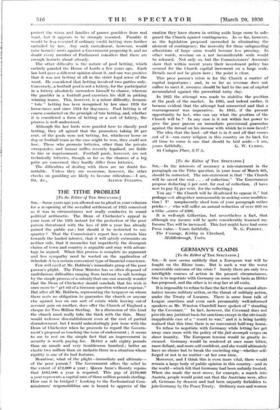THE TITHE PROBLEM
[To the Editor of THE SPECTATOR.] SIR,—Some years ago you allowed me to plead in your columns for a re-opening of the so-called settlement of 1925 conceived as it was in circumstances not really conducive to sound political arithmetic. The Dean of Chichester's appeal in your issue of the 13th instant for the protection of the poor parson threatened with the loss of IGO a year has already gained the public ear ; but should it be restricted to one quarter ? That the Commission's report has a certain bias towards the landed interest, that it will satisfy extremists on neither side, that it reconciles but imperfectly the divergent claims of town and country is arguable and may with advan- tage be argued. When this process is complete no argument and less sympathy need be wasted on the application of
• Schedule A to a certain convenient type of financial conscience.
Few will cavil at Mr. Baldwin's immediate grasp of the poor parson's plight. The Prime Minister has so often disposed of multifarious difficulties ranging from beetroot to salt herrings by the simple process of a subsidy that one can scarcely wonder that the Dean of Chichester should conclude that his wish is once more to " get rid of a tiresome question without expense." But after all Mr. Baldwin, representing the taxpayer on whom there rests no obligation to guarantee the church or anyone else against loss on one sort of estate while leaving out of account gain on another, does offer the Church of England a cheque for Two Million Sterling. In a discussion of this kind the church must really take the thick with the thin. Many would welcome disestablishment even at the cost of partial disendowment, but I would unhesitatingly join issue with the Dean of Chichester when he proceeds to regard the Govern- ment's proposal as touching the issue of endowment ; it seems to me to rest on the simple fact that an improvement in security is worth paying for. Better a safe eighty pounds than an unsafe and very troublesome hundred ; better an elastic two million than an inelastic three in a situation whose rigidity is one of its bad features.
Meantime, what of the plight—immediate and ultimate— of the poor parson ? The Government offers the relief to the extent of £72,000 a year ; Queen Anne's Bounty rejoins that £182,000 a year is required. This gap of £110,000 a'year represents a capital sum of three million pounds sterling. How can it be bridged ? Looking to the Ecclesiastical Com- missioners' responsibilities one is bound to approve of the
caution they have shown in• setting aside large sums to safe- guard the Church against contingencies. in so far, however,
as the legislation proposed succeeded - in eliminating the element of contingency, the necessity for these safeguarding allocations of large sums would become less pressing. In other words, revenue on a not inconsiderable scale would be released. Not only so, but the Commissioners' Accountts show that within recent years their investment policy has secured for 'the Church capital increment on a large scale. Details need not be given here ; the point is clear.
This poor parson's crisis is for the Church a matter of . capital importance ; and, in so far as revenue does not . suffice to meet it, recourse should be had to the use of capital accumulated against the, proverbial rainy day.
In 1925 the attempt was made to stabilise the position at the peak of the market. In 1935, and indeed earlier, it became evident that the attempt had miscarried and that . a rearrangement was imperative. In 1945, if the present opportunity be lost, who can say what the position of the Church will be ? In any case is it not within her power to • give the poor parson an immediate provisional .guarantee against the inroad on his income with which he is-now faced ? The idea that the land—all that is in it and all that conies . out of it—can carry religion in this country on its back for all-time to come is one that should be laid aside.—I am,


































































 Previous page
Previous page